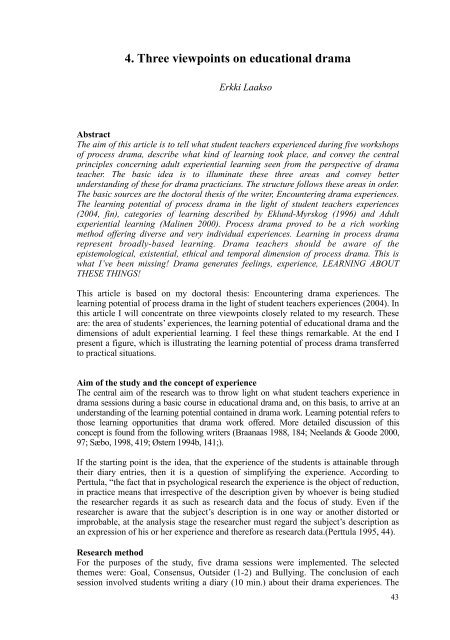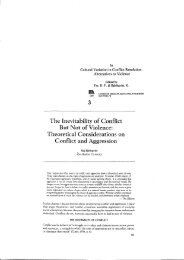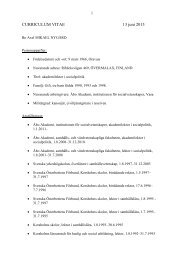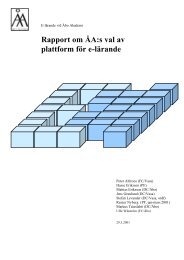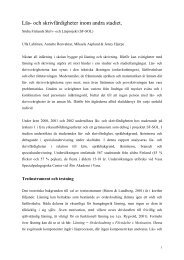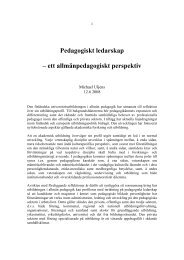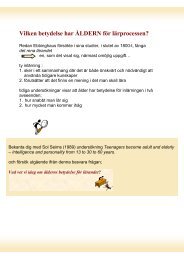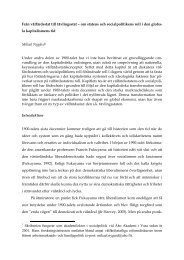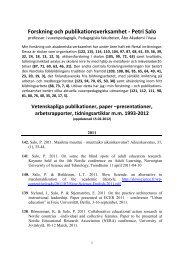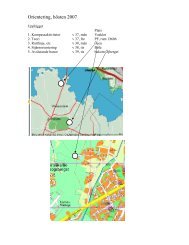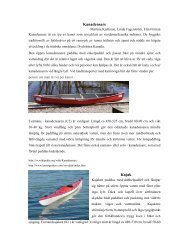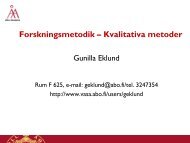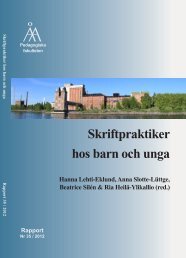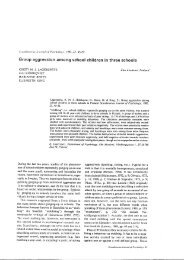Drama Boreale - Åbo Akademi
Drama Boreale - Åbo Akademi
Drama Boreale - Åbo Akademi
You also want an ePaper? Increase the reach of your titles
YUMPU automatically turns print PDFs into web optimized ePapers that Google loves.
4. Three viewpoints on educational drama<br />
Erkki Laakso<br />
Abstract<br />
The aim of this article is to tell what student teachers experienced during five workshops<br />
of process drama, describe what kind of learning took place, and convey the central<br />
principles concerning adult experiential learning seen from the perspective of drama<br />
teacher. The basic idea is to illuminate these three areas and convey better<br />
understanding of these for drama practicians. The structure follows these areas in order.<br />
The basic sources are the doctoral thesis of the writer, Encountering drama experiences.<br />
The learning potential of process drama in the light of student teachers experiences<br />
(2004, fin), categories of learning described by Eklund-Myrskog (1996) and Adult<br />
experiential learning (Malinen 2000). Process drama proved to be a rich working<br />
method offering diverse and very individual experiences. Learning in process drama<br />
represent broadly-based learning. <strong>Drama</strong> teachers should be aware of the<br />
epistemological, existential, ethical and temporal dimension of process drama. This is<br />
what I’ve been missing! <strong>Drama</strong> generates feelings, experience, LEARNING ABOUT<br />
THESE THINGS!<br />
This article is based on my doctoral thesis: Encountering drama experiences. The<br />
learning potential of process drama in the light of student teachers experiences (2004). In<br />
this article I will concentrate on three viewpoints closely related to my research. These<br />
are: the area of students’ experiences, the learning potential of educational drama and the<br />
dimensions of adult experiential learning. I feel these things remarkable. At the end I<br />
present a figure, which is illustrating the learning potential of process drama transferred<br />
to practical situations.<br />
Aim of the study and the concept of experience<br />
The central aim of the research was to throw light on what student teachers experience in<br />
drama sessions during a basic course in educational drama and, on this basis, to arrive at an<br />
understanding of the learning potential contained in drama work. Learning potential refers to<br />
those learning opportunities that drama work offered. More detailed discussion of this<br />
concept is found from the following writers (Braanaas 1988, 184; Neelands & Goode 2000,<br />
97; Sæbo, 1998, 419; Østern 1994b, 141;).<br />
If the starting point is the idea, that the experience of the students is attainable through<br />
their diary entries, then it is a question of simplifying the experience. According to<br />
Perttula, “the fact that in psychological research the experience is the object of reduction,<br />
in practice means that irrespective of the description given by whoever is being studied<br />
the researcher regards it as such as research data and the focus of study. Even if the<br />
researcher is aware that the subject’s description is in one way or another distorted or<br />
improbable, at the analysis stage the researcher must regard the subject’s description as<br />
an expression of his or her experience and therefore as research data.(Perttula 1995, 44).<br />
Research method<br />
For the purposes of the study, five drama sessions were implemented. The selected<br />
themes were: Goal, Consensus, Outsider (1-2) and Bullying. The conclusion of each<br />
session involved students writing a diary (10 min.) about their drama experiences. The<br />
43


